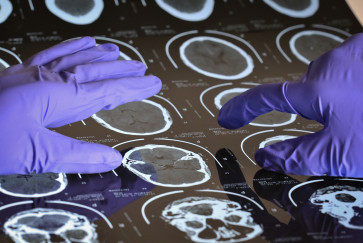Founded in 2016 and expanded and renamed in 2019, QSIB endeavors to transform human health through technological breakthroughs and innovative startups while simultaneously training future leaders in both engineering and medicine. Made up of approximately 30 medical faculty and 15 technical faculty collaborators, 300 undergraduate students and postdoctoral fellows, and 200 graduate (MS and PhD) students, QSIB has realized several accomplishments in support of this mission. Fueled by support from Querrey, QSIB affiliates have published findings in 400 publications, with 150,000 citations globally. They have disclosed 150 inventions, resulting in 120 filed patent applications and 60 issued patents, 50 of them licensed to commercial entities. And they have founded seven startups, with more than $150 million in follow-on funding and 200 technical jobs created.
John A. Rogers, the Louis Simpson and Kimberly Querrey Professor of Materials Science and Engineering, Biomedical Engineering and Neurological Surgery, will lead QSI-TEAMS. Rogers also directs QSIB.
“At QSIB, we have a proven track record of developing technologies that address important unmet clinical needs — publishing the results in the highest impact science journals and seeding the development of FDA-regulated medical devices,” said Rogers. “QSI-TEAMS will build upon these successes and reduce barriers to scaled deployment in medical settings. Through deep engagements with our clinical collaborators, we will now also have the capacity to co-author papers in the most competitive medical journals, with studies that optimize the benefits to patients and accelerate the translation process — all with tremendous educational value for our students.”
QSI-TEAMS will have a footprint on Northwestern’s Chicago and Evanston campuses. Support from Querrey is funding the immediate start-up of the institute, including clinical experts and engineers, fellowships for MD/PhD and PhD students, equipment and other operations costs.
“We are delighted to launch QSI-TEAMS as another expansion of our efforts to bring innovation out of the lab and directly to patients,” said Christopher Schuh ’01 PhD, dean of the McCormick School of Engineering. “Kimberly’s vision and support help us fill critical gaps for scaling technologies and bridging into larger clinical trials. It helps advance a suite of strategic initiatives to support better connectivity between engineering and medicine at Northwestern.”
Querrey’s support for QSI-TEAMS builds on her distinguished legacy of advancing Northwestern’s academic priorities.
“In this moment of unprecedented possibility, investing in academic research has never been more vital,” Querrey said. “Northwestern already stands at the forefront, home to renowned research centers and institutes powered by visionary faculty. QSI-TEAMS will build the connective framework that unites these strengths, unlocking new pathways for discovery and empowering us to realize the full potential of our collective brilliance.”
Querrey’s gifts in support of research and innovation at Northwestern include: the Louis A. Simpson and Kimberly K. Querrey Biomedical Research Center, Kimberly K. Querrey and Louis A. Simpson Institute for Bioelectronics, Querrey InQbation Lab, Querrey Simpson Institute for Regenerative Engineering at Northwestern University, Simpson Querrey Institute for Epigenetics, Simpson Querrey Lung Institute for Translational Science, Simpson Querrey Center for Neurovascular Sciences, Simpson Querrey Center for Neurogenetics and Mesulam Center for Cognitive Neurology and Alzheimer’s Disease, as well as several endowed professorships and research centers across STEM and business disciplines, including the recently announced Kimberly Querrey Professorship of Astrophysics.
Querrey’s leadership in research is exercised through her membership and past chairship of the Research, Innovation and Entrepreneurship Committee of the Board of Trustees, where she also serves as current chair of the Governance and Nominations Committee and member of the Executive Committee.



